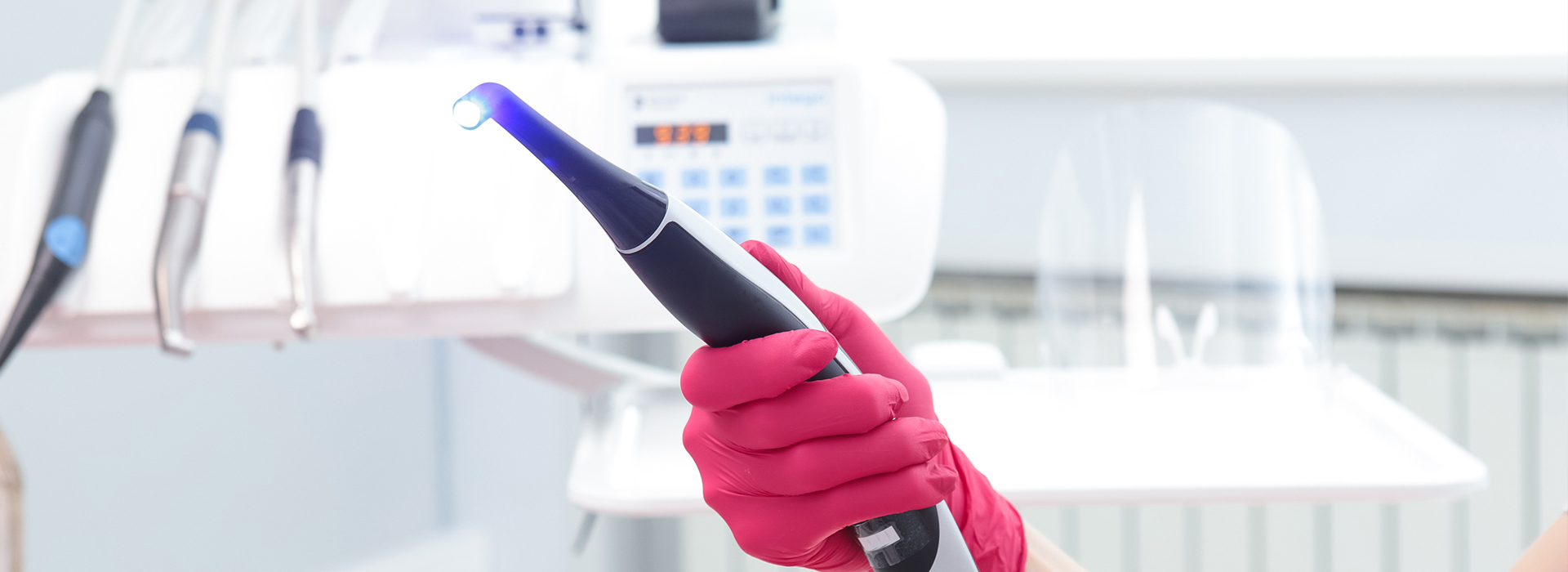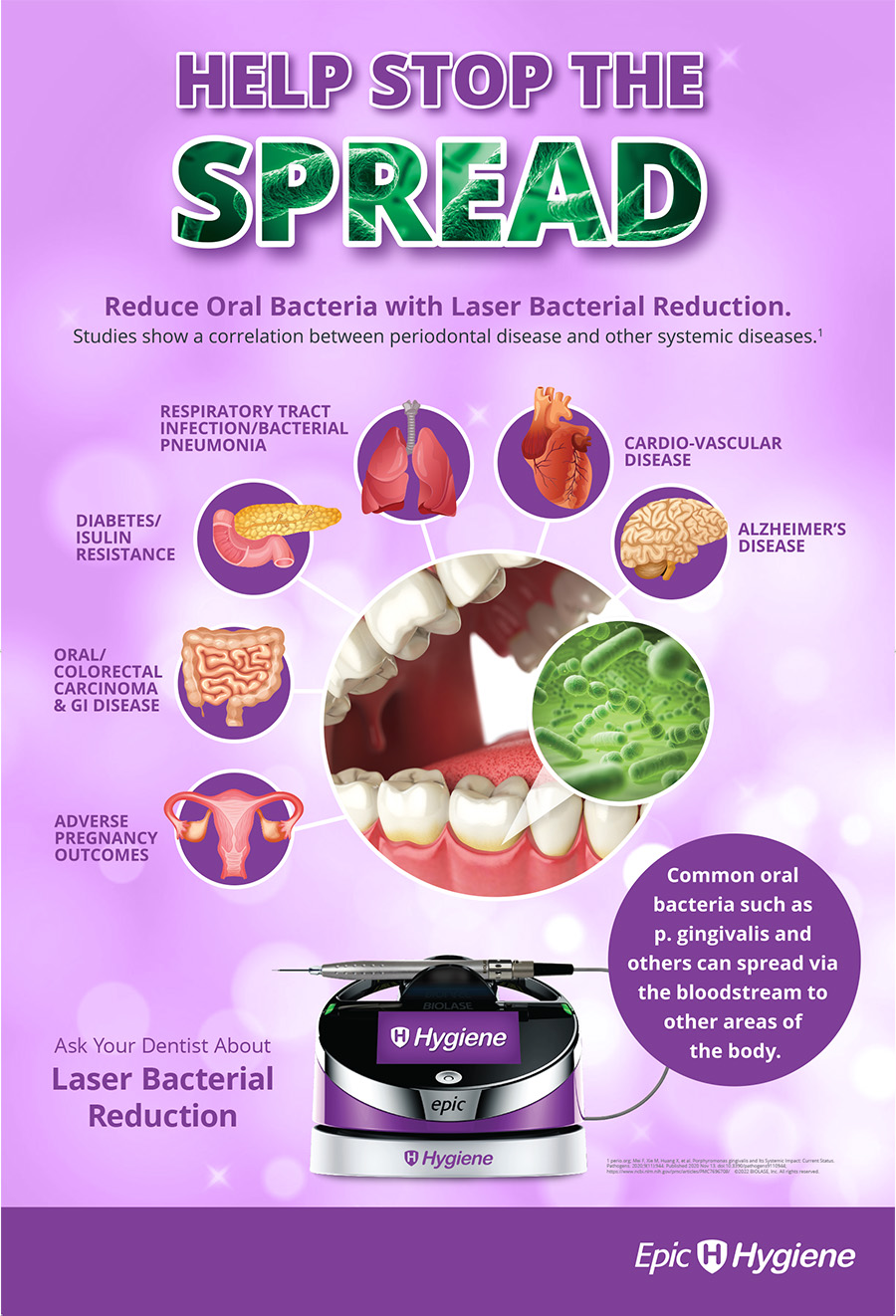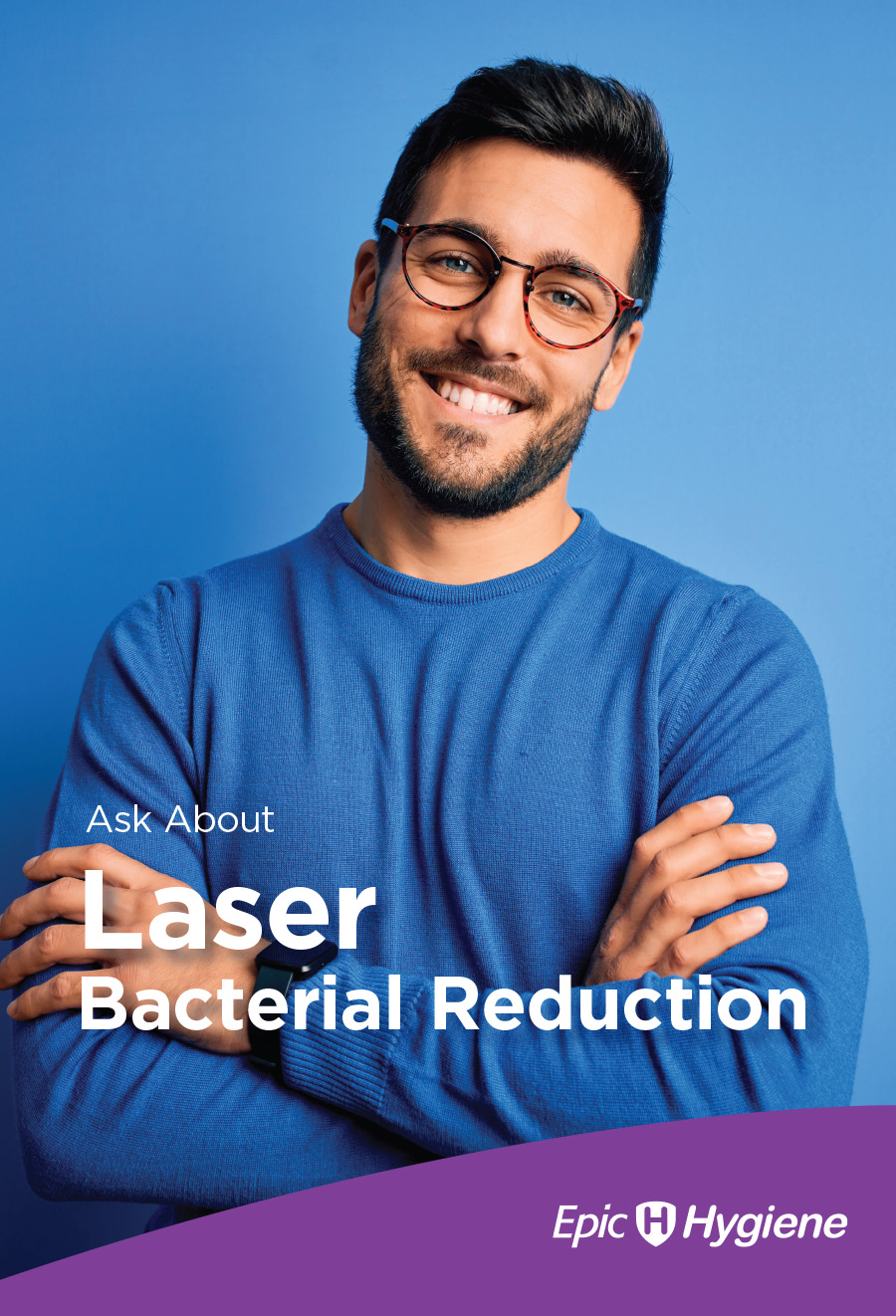

We are thrilled to announce the latest addition to our dental office: the Epic X, an exceptional all-in-one diode laser system designed by Biolase. Elevate your dental practice to new heights with this cutting-edge technology that promises to revolutionize your patient care and treatment outcomes.
With the Epic X, precision is at your fingertips. This state-of-the-art diode laser delivers unparalleled accuracy and efficiency in soft tissue management. Equipped with adjustable power settings and multiple modes, including continuous wave and pulsating, the Epic X allows you to tailor treatments to each patient's unique needs. Embrace the era of minimally invasive procedures while maximizing your patients' comfort.
Say goodbye to limitations with the Epic X. This versatile diode laser system offers a comprehensive array of treatment options, from periodontal therapy and soft tissue surgery to pain relief and teeth whitening. With a wide selection of fiber tips and accessories, you have the flexibility to address a diverse range of cases with precision and confidence. Expand your practice capabilities and provide your patients with comprehensive, exceptional care.

Simplicity meets innovation with the Epic X's user-friendly interface. The intuitive touchscreen display ensures effortless navigation and operation, allowing you to swiftly access all laser functions. Streamline your workflow and reduce chairside time, thanks to the Epic X's smart design and wireless footswitch. Seamlessly integrate this all-in-one diode laser into your daily practice, enhancing both efficiency and patient experience.
At our dental office, patient safety is paramount. The Epic X is equipped with advanced safety mechanisms, including adjustable beam delivery and tissue interaction modes, ensuring optimal tissue protection and minimizing the risk of unintended thermal damage. Rest assured that with the Epic X, you can deliver treatments with utmost precision and confidence.
Crafted with durability and reliability in mind, the Epic X by Biolase is built to withstand the demands of a busy dental practice. Rigorously tested and engineered using high-quality materials, this diode laser system offers exceptional performance and longevity, supporting you in delivering consistent, top-tier care year after year.
Join the league of leading dental professionals who have embraced the Epic X as their go-to diode laser system. Experience the power, precision, and versatility of this groundbreaking technology, and take your practice to the next level of excellence.
Discover the endless possibilities with the Epic X. Upgrade your dental office with this all-in-one everyday diode laser by Biolase. Elevate patient care, achieve remarkable clinical outcomes, and set new standards in your field. Welcome the future of dentistry and place your order for the Epic X today.

Laser dentistry uses focused light energy to perform a variety of dental procedures on soft and hard tissues. Modern dental lasers are designed to cut, remove, disinfect, or stimulate tissue with a high degree of precision while minimizing trauma to surrounding areas. Clinicians select specific wavelengths and settings depending on the tissue type and clinical objective.
Lasers are used in restorative, periodontal, surgical and cosmetic applications and may complement conventional instruments rather than replace them entirely. Because laser energy interacts differently with enamel, dentin and soft tissue, dentists tailor treatment plans to each patient’s anatomy and needs. The goal is to achieve predictable clinical results with less discomfort and faster healing when appropriate.
Dental lasers are versatile and can assist in treating tooth decay, periodontal disease, oral lesions, and soft-tissue surgeries such as frenectomies or biopsies. They are also used to cure restorative materials, perform selective decay removal, and to activate in-office teeth whitening systems. Usage varies by laser type; some lasers are optimized for hard tissue while others are intended for soft tissue work.
In periodontal therapy, lasers can help reduce bacteria and remove diseased tissue around the gums, while in restorative care they can preserve more healthy tooth structure during cavity preparation. For oral surgery, lasers can provide precise incisions with reduced bleeding and swelling. Your dentist will recommend lasers for procedures where their specific benefits align with the clinical goals.
Dental lasers emit concentrated light energy at precise wavelengths that interact with water and tissue chromophores to produce cutting, ablation, coagulation, or disinfection effects. For hard tissue procedures, the laser energy excites water molecules within the tooth structure to remove targeted areas without mechanical contact. For soft tissue, different wavelengths are absorbed by blood and pigment, allowing controlled vaporization or coagulation.
Because lasers often work without direct contact, they can reduce vibration and heat compared with rotary instruments, which may decrease patient discomfort. Laser settings—such as power, pulse duration and repetition rate—are adjusted to achieve the desired clinical effect while protecting adjacent structures. Proper training and calibration are essential to ensure safe and effective outcomes.
Many patients experience less discomfort with laser procedures compared with conventional approaches, but pain perception varies by individual and by the specific treatment being performed. For minor soft-tissue work and some cavity preparations, lasers can often reduce or eliminate the need for local anesthesia because they produce less vibration and pressure. More extensive procedures or areas with deep nerve involvement may still require anesthetic for patient comfort.
Clinicians evaluate each case and discuss anesthesia options with the patient before treatment begins to ensure a comfortable experience. For anxious patients, dentists can combine laser therapy with topical or injectable anesthetics and calming techniques to achieve a relaxed visit. Post-procedure soreness is typically mild and resolves more quickly when laser therapy limits tissue trauma.
Laser dentistry can offer several clinical advantages including improved precision, reduced bleeding, minimized swelling, and preservation of healthy tissue during cutting or decay removal. These benefits often translate to faster healing and less post-operative discomfort for many procedures, and in some cases the need for sutures or prolonged recovery is reduced. Lasers can also enhance visualization and sterilize the treatment site, potentially lowering bacterial load.
At Liberty Dental Care PC by Park One Dental, lasers are integrated into treatment plans when their specific benefits align with patient needs and clinical goals. The choice to use laser technology is guided by evidence-based protocols and the dentist’s training to ensure safety and effectiveness. Ultimately, lasers are one tool among many that can help achieve precise, patient-centered care.
While lasers provide many advantages, they are not appropriate for every procedure and have limitations related to wavelength specificity, depth of penetration, and the type of tissue being treated. Certain lasers are not effective for deep decay removal or for cutting thick bone, so traditional instruments remain necessary in many cases. Improper use or incorrect settings can cause tissue damage, underscoring the importance of clinician training and manufacturer guidelines.
Patients with specific medical conditions or implanted electronic devices should discuss laser use with their dentist and physician when applicable, as some lasers may require special precautions. The dentist will review potential risks, benefits and alternatives during treatment planning to ensure the chosen approach is safe and aligned with the patient’s overall health status. Informed consent and clear communication help manage expectations and reduce complications.
Good candidates for laser dentistry include patients seeking minimally invasive treatment, reduced bleeding, or faster soft-tissue healing, as well as those who wish to limit the use of local anesthesia when clinically appropriate. Children, anxious adults and patients with certain bleeding disorders may particularly benefit from the precision and hemostatic properties of some lasers. However, candidacy depends on the specific condition, the tooth or tissue involved, and the type of laser required.
During your consultation, the dental team evaluates medical history, oral health status and treatment goals to determine whether laser therapy is suitable. Liberty Dental Care PC by Park One Dental considers lasers as part of a comprehensive treatment plan and will recommend them when evidence and clinical judgment indicate a positive outcome. When lasers are not the best option, your dentist will explain alternative approaches and the reasons behind the recommendation.
Preparation for a laser procedure typically mirrors preparation for comparable dental treatments and may include a medical history review, a focused oral exam and appropriate pre-operative instructions. Your dentist will advise you about eating, medications and whether any pre-treatment rinses or antibiotics are necessary based on your health profile. For surgical soft-tissue procedures, it is helpful to arrange a comfortable recovery environment and plan for light activity for a short period after treatment.
If you have anxiety, discuss sedation or relaxation techniques with your dentist ahead of time so appropriate measures are arranged. Make sure to inform the dental team of any implants, pacemakers, or photosensitive conditions that could influence laser selection or safety. Clear communication prior to your visit helps ensure a smooth procedure and recovery.
Recovery after laser dentistry is often faster and less uncomfortable than after traditional surgical approaches, but outcomes depend on the procedure’s scope and the patient’s overall health. You may experience mild soreness, sensitivity or minor swelling for a short period, and your dentist will provide specific aftercare instructions such as gentle oral hygiene practices and recommended analgesics if needed. Maintaining good oral hygiene and following dietary recommendations supports healing.
Follow-up visits may be scheduled to monitor healing and ensure the treated area is responding as expected, particularly after periodontal or surgical interventions. If unusual symptoms such as prolonged pain, heavy bleeding or signs of infection occur, contact the dental office promptly for evaluation. Adhering to post-operative guidance helps minimize complications and optimize long-term results.
Laser dentistry and traditional instruments each have strengths and limitations, and they are often complementary rather than mutually exclusive. Lasers offer precision, decreased bleeding and sterilization benefits, while conventional rotary and manual instruments remain superior for certain tasks like extensive removal of hard tissue or shaping restorative margins. The decision between modalities is based on clinical need, anatomic considerations and the dentist’s judgment.
Evidence-based practice supports selecting the right tool for each clinical objective to achieve predictable outcomes. A skilled clinician will explain why a laser or a traditional instrument is preferred for your treatment, including any trade-offs in terms of recovery, comfort and long-term prognosis. Patients benefit when technology is applied thoughtfully within a comprehensive care plan.
Liberty Dental Care PC by Park One Dental
112-10 Liberty Avenue, Richmond Hill, NY 11419Park One Dental
1601 Jericho Turnpike, New Hyde Park, NY 11040 (516) 354-0033